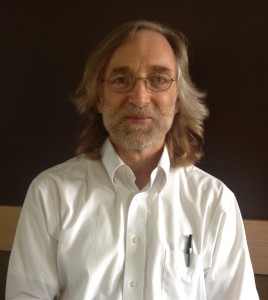David Templeton has had one heck of a journey to a healthy vegan lifestyle.
The Pittsburgh Post-Gazette reporter said he discovered he had type 1, or juvenile, diabetes in 1966. Two decades later, Dave learned he had kidney disease—a common renal failure for diabetics—which he battled for 25 years.
Then, Dave said his doctor told him he would be on dialysis in four years.
There was no denying it: Dave’s kidney functions were declining and he needed to make a change if he wanted to avoid dialysis. After doing extensive research in 1995, he said he began experimenting with a vegetarian diet despite protests from his dietitian, who said Dave needed to eat meat for protein. However, Dave’s decision ended up paying off because he never experienced dialysis.
So, did a vegan diet really prevent Dave from going on dialysis? Did his diet actually improve the condition of his diabetes and kidney disease?

David Templeton, former diabetic
Getting a pancreas and kidney transplant is what ultimately cured Dave of diabetes and kidney disease, but eating mostly vegetarian or vegan played a large role, too.
“I was largely vegetarian with lapses,” Dave said. “I was supposed to be on dialysis in 1999, according to the doctor, but I maintained my kidney functions. I stabilized it.”
Dave said he now follows a whole plant vegan diet and not only feels—but is—healthy.
“I was on seven pills a day, and now I’m on three,” Dave said. The reporter said the three pills he takes are the standard prescription for any transplant patient and are necessary to protect his new organs. “My doctor said he’s never seen a kidney transplant patient that’s on no other prescription drugs.”
“Maintaining normal blood sugar and following the veggie diet were key to maintaining my kidney function and avoiding dialysis. I’m healthier now,” Dave told us. He’s been vegan for almost four years now. “Even if you can be vegan most of the time, it will help you.”
DAVE’S WHOLE FOOD DIET
The reporter said that people have called him disciplined for being vegan, but Dave just understands the importance of nutrition. “If you face a challenge in life, you have to face that challenge and eliminate that challenge,” he said. “If you eat well, exercise and live a fairly clean life, you’re going to fight off disease better than any medicine.”
Dave said, “You might live to be 85, but those last 15 years are horror. Your goal in life is to live a long life—to die quicker. To live an active, fully functional life until that moment where you’re gone. If you look at America, we’re living to 75-80 on average, but people are living the last 20 years of their life in misery.”
“A vegan diet increases the chances of a person living a full, long life with the person remaining healthy until a quick death, without the burden of chronic disease,” Dave said.
He said that raw pumpkin seeds (which are good way to boost serotonin!) are a huge staple in his diet and can always be found in his car.
For breakfast, Dave said he likes Bob’s Red Mill whole grain cereal with soy milk and topped with cinnamon, sunflower or pumpkin seeds, berries, and turmeric. “If you have turmeric once a day, your problems are solved,” Dave said. He said he pairs his cereal with 100% vegetable juice that can be bought at Trader Joe’s.
Or, Dave said he will drink a smoothie, which his nearly-vegan daughter got him hooked on. “It’s great, but it’s a burden in life because it adds 15 minutes to my morning. I put everything that I can find in it,” he said. “That gives you enough nutrition for the entire day.” Dave said he makes smoothies out of foods such as celery, kale, ginger, spinach, frozen berries, banana, apple and sometimes turmeric.
“For lunch, I go to ethnic restaurants because at American restaurants it’s just fries and salads with bad lettuce and unripe tomatoes,” Dave said.
And for dinner? “I’ll go home and get Brussel sprouts, green beans, mixed peas, and sometimes asparagus—I might have four or five vegetables—and I’ll just microwave them. I’ll put some salt on it and drizzle olive oil, and I also include sunflower seeds,” he explained. “It sounds pretty simple, but with a little bit of olive oil—I just stir it up and eat it. I can’t get enough of that; I’m not hungry after that.”
He said he doesn’t believe in a perfect vegan, but he wouldn’t trade his diet for anyone else’s. Dave does admit that he had to cut back on consuming oil, the first of several diet confessions.
Dave’s next confession was that he gets a little bag of pumpkin seeds for the drive home from work. “The seeds are almost complete foods. They’ve got the protein, they’ve got the oil and the fiber,” he said.
He said he tries to avoid sugar after doing news stories on sugar consumption. “It convinced me that I need to eliminate as much as I can. I’m not taking any added sugar,” Dave said, although he admitted that he occasionally eats dark chocolate. “As my job as a health and science writer, I do delve into these issues on a regular basis.”
Dave’s biggest confession was his weakness for pretzel nubs (which are vegan, naturally). “I eat them during my ride home from work, usually between 7 and 9 p.m. because I haven’t eaten since 2 p.m.,” he said. “The pumpkin seeds and the pretzel nubs get me through the day. Those pretzel nubs are my weakness.”
The reporter said you don’t have to eat a big feast; he enjoys eating vegetables in oil microwaved. For a quick salad, Dave said he will chop up some vegetables, add nuts and beans, and pour vinegar oil onto it. “I don’t need to follow a recipe all the time. If I do have certain things, I’ll search those on the internet,” Dave said he usually cooks with garlic, ginger and cumin.
Dave said that he doesn’t get sick nearly as much as his wife and daughter do, which he thanks his whole plant diet for. He also said, proudly, that he rarely misses work.
Keep on reading to learn more about Dave’s struggle with diabetes and how eliminating meat and dairy changed his life.
DIAGNOSED WITH DIABETES
Dave said he found out he had type 1 diabetes in 1966—a time when it was hard to control diabetes. “You couldn’t test your blood sugar and you couldn’t maintain it very well. The technology wasn’t there,” he said.
Type 2 diabetes is more common and results from poor diet, no exercise, as well as other factors. Click here to read more about type 2 diabetes.
Dave explained what type 1 diabetes is, “You have an autoimmune attack on both your pancreas and the cells that produce insulin—insulin is what turns dietary sugar into energy. When you’re not able to turn sugar into energy, the sugar builds up in your blood to high levels that can be very dangerous and damaging to your body. So you have supplement your body with the insulin that your body would otherwise produce in order to process that glucose.” Learn more about type 1 diabetes here.
“Insulin wasn’t discovered until the 1920s and this is 40 years later. There hadn’t been a lot of progress on diabetes,” Dave said, telling us about the glass syringes with a needle you had to sharpen because there weren’t disposable needles. “You got the shot in your leg. It got to be painful because you were sharpening it. It was a little bit insane.”
Twenty years later, in the ‘80s, Dave developed kidney disease, which he said males are more prone to. Renal failure had begun, he said. Read more about kidney disease and its link to diabetes here.
Dave said the technology to test your blood sugar became available in the late 1980s. “I tested compulsively to maintain normal blood sugar levels, which is hard to do,” he said.
In the mid-nineties, Dave said he started seeing a specialist for diabetes who told him: ‘You will be on dialysis in four years.’
“They hook you up and they filter your blood. They do what your kidneys would do. They filter your blood of all the impurities,” Dave said. “But a machine does it, rather your body.”
“That’s a horror show—dialysis—because people are disabled on dialysis,” Dave said. Patients must undergo dialysis three times a week, interfering with their everyday life, such as diet and energy levels, he added.
That was Dave’s wake-up call.
AVOIDING DIALYSIS THROUGH DIET
“I asked, ‘What can I do to prevent that?’ and he told me meat is hard on your kidneys. Even back then, they knew meat was tough on your kidneys,” Dave said. “The meat proteins are so large and crazy that your kidneys can’t really filter them easily.”
Dave said he started seeing a dietitian, who helped him reduce his meat consumption and advised him to eat no more than a pack of cards of meat a day. Dave decided that reducing meat wasn’t enough. He needed to eliminate it.
“I started a vegetarian diet and eliminated meat. Now, I didn’t stay with that; I was off and on. I would go for maybe a month or two and then eat meat for a couple days. Ever since September of 1995—even when I was eating meat—I was only eating a very small amount. I got off milk, but I didn’t get off cheese immediately. I think one of the big problems for everyone is cheese,” Dave said. He also noted that being vegetarian or vegan doesn’t automatically make you healthy.”
Dave said his dietitian disagreed with his vegetarian diet because he needed protein from meat. But Dave said he knew, after doing research, that beans, plants and nuts were a great source of protein.
“When I was a vegetarian and I did eat meat, I always got sick,” he said. “Your body is almost crashing in order to take care of this stuff that is so hard to metabolize that all your energy and resources are going toward it.” This explains why people want to go to sleep after a meal and why workers are lethargic after their lunch break, according to Dave.
Dave said he kept a steady kidney function until 2008, which he attributes to his diet. “I maintained for years on a vegetarian/vegan diet with only an occasional consumption of meat until 2008,” he said.
Dave said his doctor suggested he get on the transplant list. He began seeing a nephrologist (a kidney doctor) who told Dave he would not only get a new kidney, but a new pancreas as well.
“I would be cured of kidney disease and diabetes. I had kidney disease for over 25 years and diabetes for about 45 years,” Dave said.
Dave said he wasn’t eating meat at all while he was on the transplant list from 2008-11. “I went pretty much vegan, although I was probably still eating cheese,” he said, citing an interview with T. Colin Campbell and reading The China Study as encouragement for ditching meat and dairy.
Dave said of The China Study: “The first 100 pages were enough for me. I read it and said, wow.”
However, he said he began to fight with his doctors over his vegan diet.
“They told me I had to go back on meat. I was spilling protein instead of processing it; it wasn’t being used. I was anemic, which is very common with kidney disease. I had parathyroid problems, which commonly occurs when kidney function declines. I was on a lot of pills, I was on Vitamin D and iron. I had 14 percent kidney function, which isn’t good, but it was enough. Seven percent is dialysis. Every three months I had blood work to check my kidney function,” Dave said. “So I get back on meat. It’s at 12 percent, next time it’s at 11, next time’s it’s at 10. It’s falling; it’s spiraling downward now. I’m at 10, I’m at nine, I’m at eight. I said, this is ridiculous—they were getting me ready for dialysis.”
Dave said that his nephrologist said he would go on dialysis if his kidney function fell to seven percent. “I was at 8 percent at the time. That’s when I went fully vegan in an effort to maintain 8 percent function. But the vegan diet managed to bump up my kidney function to nine percent, which I maintained for the better part of a year,” Dave said. He said that he not only avoided dialysis, but maintained nine percent of his kidney function until his transplant.
But he would have to wait for his organ transplants.
“I went in eight times for a transplant and was sent home because the pancreas organ wasn’t pristine enough. It didn’t pass their test,” Dave said. “Eight different times.”
TWO TRANSPLANTS LATER…
“On October 24, 2011, I get a call,” he said. “I had three months before starting dialysis. The doctor called me in and said, ‘These aren’t ideal—the deceased donor had an infection.’ He was 88 lbs and I was 170 lbs at the time from water weight and my kidneys not being able to process it.”
Dave said he decided to go through with the transplant after hearing that his doctor thought the organs were a good match. He said he expected to wait five or six hours before undergoing the transplant surgery, but they were ready to go when he got there.
“It’s an ordeal, but I’d do it tomorrow if I had to again. They starve you for five or six days after the transplant. Starting Monday night, I didn’t even have any broth until Saturday. They’re preserving the pancreas,” Dave recalled.
Dave said his doctor told him he would gain about 30-40 lbs after his transplant surgery since he wouldn’t be a diabetic with diet restrictions anymore. However, Dave didn’t gain weight because he continued to eat a whole food vegan diet after his surgery.
Now, after he’s written several biographies of people he’s met, Dave said he would like to write his own self-published piece. He also said he would like to talk to diabetes education classes to help others and teach them the importance of nutrition. Dave said people shouldn’t stop eating meat cold-turkey, but instead learn what foods they like. “There’s plenty of things out there to like,” he said. People just have to be open to experimenting and trying something new.
“I think what I can show people is that 48 years after a type 1 diabetes diagnosis and two transplants, kidney disease, and a life of other potential complications from diabetes, I’m currently working full-time at age 59, never missing a day of work and I’m on no other drugs than the three drugs required to maintain my new organs. Tell me: what is hard to understand about that that won’t convince people that the food I’m eating is benefiting me?” Dave said.
“Why would I continue eating a vegan diet if I didn’t see that I’m healthier? I’m on no drugs and I’m functional,” he said. “People are saying I look better than I ever have.”




